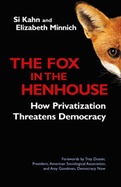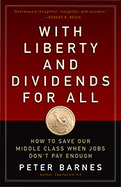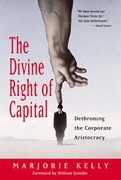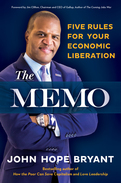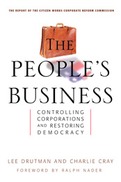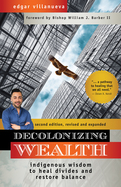- Read a transcript of Amy Goodman's interview with Si and Elizabeth on Democracy Now!
- A legendary activist and a distinguished public philosopher address a timely but complex issue in a way that is accessible and compelling
- Evaluates privatization not just economically, but in social, political, and human terms
- Offers principles and practices for creating alternatives to privatization and strengthening the public sector
Barnes proposes a simple market-based way to provide supplemental income to all Americans.
- New analysis: Barnes explains why the plight of our middle class is now so dire that conventional policies will no longer save it.
- New solution: Barnes proposes a simple market-based way to provide supplemental income to all Americans.
Economic inequality has become like the weather: everyone talks about it, but nobody knows what to do about it. Working Assets cofounder Peter Barnes has a plan: pay equal dividends to everyone from wealth we own together.
Barnes argues that, thanks to automation, globalization, and winner-take-all capitalism, there will never again be enough high-paying jobs to sustain a large middle class. The only hope lies in nonlabor income-that is, in jobs plus something more. Building on our Declaration of Independence, an essay by Thomas Paine, and a thirty-year-old program in Alaska, Barnes proposes paying monthly dividends to every American. This supplemental income would come from assets we hold in common-the atmosphere, the natural world, our monetary system, and more. Such dividends would not only keep our economy humming but also make it unprofitable to abuse nature.
Barnes's proposal bypasses the current gridlock between left and right; once set up, the dividend system is purely market based. This work is a truly visionary yet eminently practical solution to a seemingly intractable problem.
In The Divine Right of Capital, Kelly argues that focusing on the interests of stockholders to the exclusion of everyone else's interests is a form of discrimination based on property or wealth. She shows how this bias is held by our institutional structures, much as they once held biases against blacks and women.
The Divine Right of Capital exposes six aristocratic principles that corporations are built on, principles that we would never accept in our modern democratic society but which we accept unquestioningly in our economy. Wealth bias is a holdover from our pre-democratic past. It has enabled shareholders to become a kind of economic aristocracy. Kelly shows how to design more equitable alternatives-new property rights, new forms of corporate governance, new ways of looking at corporate performance-that build on both free-market and democratic principles.
We think of shareholder primacy as the natural law of the free market, much as our forebears thought of monarchy as the most natural form of government. But in The Divine Right of Capital, Kelly brilliantly demonstrates that it is no more "natural" than any other human creation. People designed this system and people can change it.
We need a change of mind as profound as that of the American Revolution. We must question the legitimacy of a system that gives the wealthy few-the ten percent of Americans who own ninety percent of all stock-a disproportionate power over the many. In so doing, we can fulfill the democratic principles of our nation not only in the political sphere, but in the economic sphere as well.
- Updated paperback edition includes a new chapter and a Reader's Guide
- Explores the real causes of the Enron fiasco and other recent corporate scandals
- Explodes the myth that the stock market is "democratizing" wealth
- Gives practical guidance to help employees and communities change corporate governance and unfetter the genius of the free market
2017
Building on his personal experience of rising up from economically disadvantaged circumstances and his work with Operation HOPE, Bryant teaches readers five rules that lay the foundation for achieving financial freedom. He emphasizes the inseparable connection between “inner capital” (mindset, relationships, knowledge, and spirit) and “outer capital” (financial wealth and property). “If you have inner capital,” Bryant writes, “you can never be truly poor. If you lack inner capital, all the money in the world cannot set you free.”
Bryant gives readers tools for empowerment by covering everything from achieving basic financial literacy to investing in positive relationships and approaching wealth with a completely new attitude. He makes this bold and controversial claim: “Once you have satisfied your basic sustenance needs—food, water, health, and a roof over your head—poverty has more to do with your head than your wallet.”
Bryant wants to restore readers' “silver rights,” giving them the ability to succeed and prosper no matter what very real roadblocks society puts in their way. We have more power than we realize, if only we can recognize and claim it. “We are our first capital,” Bryant writes. “We are the CEOs of our own lives.”
More than ever, large corporations wield an unjustifiably excessive influence over our lives. The consequences are indeed frightening-environmental destruction, political corruption, erosion of democracy, increased polarization between rich and poor, declining wages and benefits, increased stress and overwork. As corporations become more powerful, these problems will only get worse.
The People's Business offers a comprehensive series of proposals for reforming and restructuring corporations so that they become the people's servants, not their masters. Writing in a lively populist style, the authors pull together recommendations from the prestigious members of the Citizen Works Commission on Corporate Reform to present a clear-headed plan of action.
Drutman and Cray discuss how corporations managed to achieve their current privileged position and offer a comprehensive approach for reconceiving corporations as engines of public prosperity, not private plunder. They outline specific reforms that could be enacted to get corporations out of politics, establish truly public-minded regulation of corporate behavior, safeguard our natural resources, combat unfair market domination by corporations, crack down on corporate crime, and challenge the corporate claim to constitutional rights.
Bolstered with relevant history and recent examples, The People's Business is a lively book that will appeal both to deeply-committed (and often frustrated) long-time activists looking for a coherent approach in the struggle for corporate accountability, as well as relative newcomers looking for immediate measures that could serve as effective means of corporate reform.
- The official report of a commission of 50 prominent leaders of the corporate reform movement that includes such notable members as Ralph Nader, David Korten, Herman Daly, Medea Benjamin, and many others
- Includes specific, detailed prescriptions for how we can take our country back from corporate rule and integrates them into a coherent strategy
- Written in an engaging, hard-hitting style with lots of concrete examples
The world is out of balance. With increasing frequency, we are presented with the inescapable truth that systemic racism and colonial structures are foundational principles to our economies. The $1 trillion philanthropic industry is one example of a system that mirrors oppressive colonial behavior. It's an industry whose name means “the love for humankind,” yet it does more harm than good.
In Decolonizing Wealth, Edgar Villanueva looks past philanthropy's glamorous, altruistic façade and into its shadows: white supremacy, savior complexes, and internalized oppression. Across history and to the present day, the accumulation of wealth is steeped in trauma. How can we shift philanthropy toward social reconciliation and healing if the cornerstones are exploitation, extraction, and control?
Drawing from Native traditions, Villanueva empowers individuals and institutions to begin to repair the damage through his Seven Steps to Healing. In this second edition, Villanueva adds inspiring examples of people using their resources to decolonize entertainment, museums, libraries, land ownership, and much more.
Everyone can be a healer and a leader in restoring balance—and we need everyone to do their part. As Villanueva writes, “All our suffering is mutual. All our healing is mutual. All our thriving is mutual.” Are you ready?


